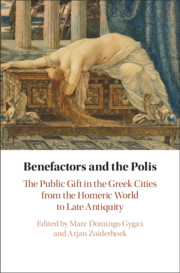 Benefactors and the Polis
Benefactors and the Polis Book contents
- Benefactors and the Polis
- Benefactors and the Polis
- Copyright page
- Contents
- Figures
- Tables
- Contributors
- Acknowledgements
- Abbreviations
- Introduction
- Part I Benefiting the Community in Early Greece
- Part II Classical Benefactors
- Chapter 3 Classical Athens and the Invention of Civic Euergetism
- Chapter 4 The Scale of Benefaction
- Part III Hellenistic Benefactors
- Part IV Benefactors and the Polis under Rome
- Part V The Decline and Fall of Euergetism?
- Conclusion
- Index
- Index locorum
- References
Chapter 4 - The Scale of Benefaction
from Part II - Classical Benefactors
Published online by Cambridge University Press: 21 January 2021
- Benefactors and the Polis
- Benefactors and the Polis
- Copyright page
- Contents
- Figures
- Tables
- Contributors
- Acknowledgements
- Abbreviations
- Introduction
- Part I Benefiting the Community in Early Greece
- Part II Classical Benefactors
- Chapter 3 Classical Athens and the Invention of Civic Euergetism
- Chapter 4 The Scale of Benefaction
- Part III Hellenistic Benefactors
- Part IV Benefactors and the Polis under Rome
- Part V The Decline and Fall of Euergetism?
- Conclusion
- Index
- Index locorum
- References
Summary
We know about the benefactors of Greek cities primarily from inscriptions that mark the honours given to them for their benefaction. But the act of benefaction, which is nothing other than the giving of a gift to a corporate body, existed independently of the honour, and this chapter seeks to turn attention to why it was that institutions needed benefactors, and the different needs of institutions of different sizes. Corporate bodies had a number of ways, including direct and indirect taxation and requiring contributions, to meet their financial and other needs, but the smaller the corporate body, the more important it was for it to cultivate benefactors. The particular need felt by Athenian demes can be seen to be reflected in the indications in the epigraphic record that they were precocious in developing ways of encouraging benefaction. But how a group relates in size to other groups is important in determining the attitudes that potential benefactors take to it, so that relative as well as absolute size matters.
- Type
- Chapter
- Information
- Benefactors and the PolisThe Public Gift in the Greek Cities from the Homeric World to Late Antiquity, pp. 96 - 112Publisher: Cambridge University PressPrint publication year: 2021
References
- 1
- Cited by
